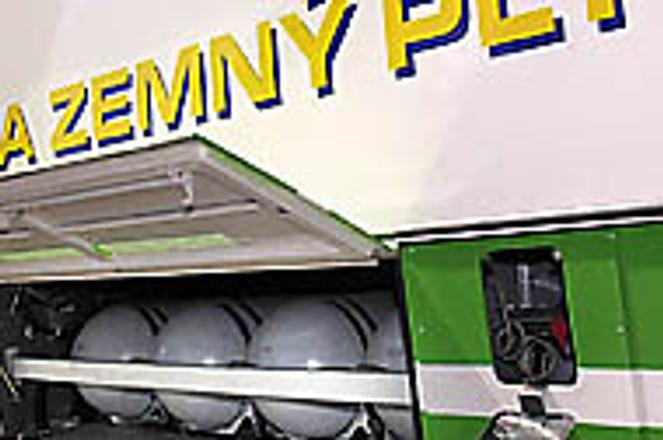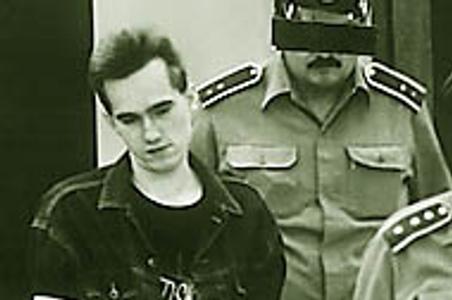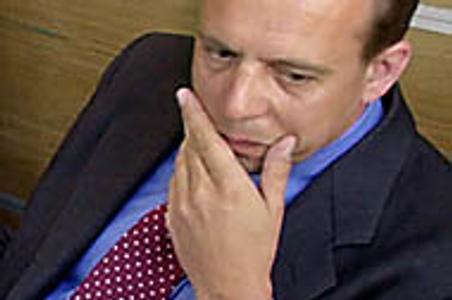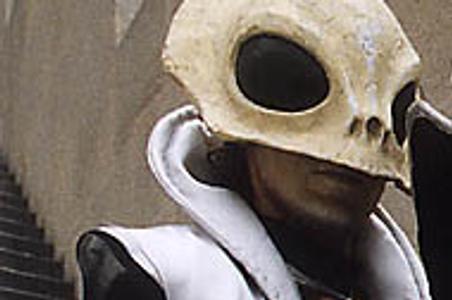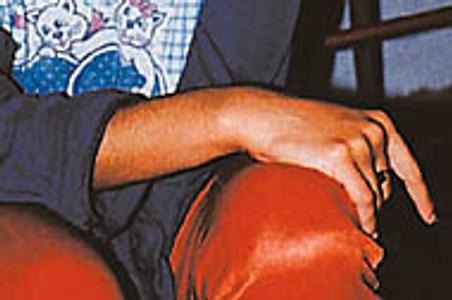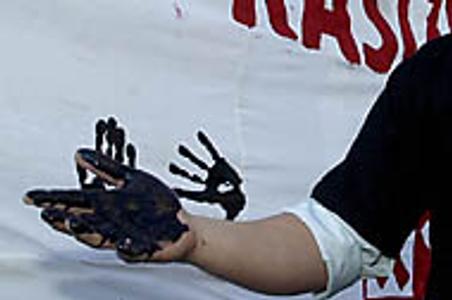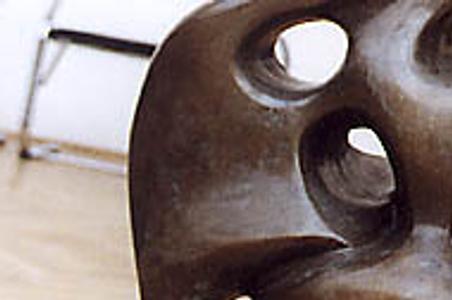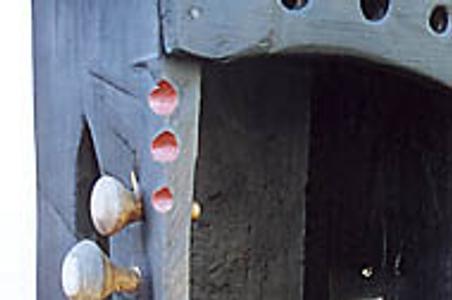Archive of articles - May 2001, page 4
If you desire to read an old article, use the search bar or select the publication date.
Transport firm rolls out first green bus
Bratislava's public transport company DPB rolled out a new, more environmentally-friendly bus running on compressed natural gas May 2, claiming that it will cut emissions from its buses in the capital by more than 60% and mean a massive saving on the costs of running its vehicles.Although more than 30 such buses run in other towns across the country, including Nitra and Trnava, the Bratislava bus was the city's first, and part of a wider project to convert all engines in the capital's 520-strong bus fleet to run on compressed gas in the next 10 years. The move was hailed by both environmentalists and Bratislava Mayor Jozef Moravčík as a big step in reducing air pollution from transport in the city.
Name tags for police decried as anti-corruption weapon
German businessman Wolfgang B. was driving in Bratislava last December when two Slovak policemen stopped him for speeding. Unaware that the maximum 'street fine' police are entitled to issue was 500 Slovak crowns ($10), he says he handed over 5,000 crowns to the two policemen."He asked for a receipt and the police gave him five different ones," said Peter S., a Slovak colleague of Wolfgang B. "He then forgot about the whole thing. Two months later, I found the receipts in his car and saw that they were each marked for 100 crowns, totalling 500 crowns. The rest [4,500 crowns] apparently just went into the policemen's pockets."
Community Corner
Latino-American dance partyOrganised runs1001 Europe lecture series in BratislavaGoethe Institute exhibitionsAustrian Culture Forum exhibitionBratislava French Institute lecture and exhibitionsSocial Centre in PiešťanyAustrian Culture Centre exhibition in PrešovBratislava Town Gallery
To laugh or weep? President Schuster's tale bears scrutiny
It's a sure bet that Slovaks have heard enough of President Rudolf Schuster's brush with death last year. But the launch of a book this week by Schuster's daughter Ingrid entitled 'Don't Cry, Mummy, Dad's Still Alive' shows that the nation's highest official still hasn't grasped to what extent the personal is political, and how little sympathy people have for a public servant so mired in self pity.
Shutting a door on the past
Management at former state bank Slovenská sporiteľňa (SLSP) held a press conference April 24 at which it made two announcements: profits of 2.4 billion crowns ($50 million) had been reached for the year 2000, while hundreds of investigations into past loan fraud had been started.The news on profits had been expected. The bank has shown, if not rude health, a steady financial recovery over the previous 18 months, having recorded a loss of 5.7 billion crowns ($117 million) at the close of 1999.But for those who have been watching the banking sector since Mikuláš Dzurinda's coalition came to power in October 1998, it was the second announcement which turned heads.
Deputy PM forced to vacate seat
Deputy Prime Minister for Integration Pavol Hamžík was fired from his job last week as a scandal over the possible misuse of European Union funds for Slovakia reached its peak. While surprised that so senior a government official had been dismissed, one political analyst said that political stability in Slovakia did not appear in danger."It hadn't appeared [until Hamžík's May 4 dismissal] that the government was ready to make such a change [18 months before the next parliamentary elections]" said Grigorij Mesežnikov, the president of the Bratislava think tank Institute for Public Affairs."Apparently, the consequences of leaving Hamžík in his post would have been graver for the government than the effect dismissing him will have on relations within the [five-party ruling] coalition. But it doesn't appear as if the coalition is willing to undertake a wider cabinet shake-up."
Business Briefs
FWA licences attract five biddersCentral bank reports FDI grows five-foldEIB to give 34 million euros for motorwaysVolume of unpaid taxes jumps on 2000 figurePact signed on Gabčíkovo industrial park
A quick guide to how the Slovak police work
Slovakia has over 20,000 police officers, divided into two major corps: state (national) police and municipal police. The easiest way to distinguish between the two is by the colour of their uniforms.State police wear olive-green uniforms, while municipal police dress in dark blue or black uniforms. An additional distinctive trait of all municipal police is the black and white chequered lining of their caps.The state police corps is divided into the following major groups:
Top Pick: Play in English 2001
The 4th annual festival "Play in English 2001" will bring eight performances of plays written by contemporary authors to Bratislava from May 17 to 19, displaying the talents of actors from the USA, Great Britain, Poland, Hungary and Slovakia."The hottest picks are the Americans and British. But the most shocking play is performed by the Hungarians. It's not suitable for anyone below the age of 18," said Peter Bednár, a member of the Bratislava English theatre union BELTS', organisers of the festival.While foreign actors will perform plays by English authors, the Slovak translated play "From a Distance" features Blaho Uhlár and Lucia Piussi, both playwrights and actors, and "Bon Voyage, Destiny!" introduces a play in English from Slovak writer Ivan Lacko.
Tourists throng as ghosts defend Bojnice castle from aliens
Arguably the country's most stunning castle, central Slovakia's Bojnice zámok is adored by Slovaks and foreigners alike. Indeed, it's so popular that a band of aliens from the Sorios 5 star system have concocted a conniving scheme to beam the castle up to their home planet."You know, I really dig this place," says alien C3M (known in his human form as Rado Star). "So I want to bring it back to my home planet. I'm greedy that way."But his greed is abandoned when an unlikely love affair develops between the alien and Kontesa, a lovely and gentle-spirited ghost.
Aiding women sold into prostitution
Eva forces a smile and says she wants to talk. But as she begins her story of sexual slavery, her chin sinks into her throat and her hand reflexively shields her eyes. "I'm sorry," she says later when a word sticks in her throat. "This isn't pleasant for me."A hard-luck single mother with no home for her children, Eva was approached by three men in 1999 who offered her a waitressing job in France. She would earn enough money in three months, they promised, to buy a flat for her family in Slovakia. There was only one catch: she would occasionally have to go to bed with strangers."I didn't have a choice," says Eva. "I was desperate."
Hopes for VÚB sale lifted by profit jump
Less than two months before its anticipated sale to one of two foreign banks, the state's Všeobecná úverová banka (VÚB) announced a first quarter profit of 433 million crowns ($9 million) May 2, up from the 261 million crown profit recorded for the first three months of 2000.With Italy's Banca Commerciale and French Societe Generale in the process of due diligence at the bank, the figures are further evidence of VÚB's growing health in the run-up to its privatisation, analysts said."After years and years of losses, this is a good sign for VÚB's future," said Martin Kabát, head of analyses at Slávia Capital brokerage house.
Police Chief: 'My men will decide' on tags
The Slovak Spectator spoke with Ľudovít Mučka, head of Bratislava Old Town's western district police, on May 4 to discuss exactly how police feel about the Interior Ministry's introduction of mandatory name tags.The Slovak Spectator (TSS): Can name tags help eliminate police corruption?Ľudovít Mučka (ĽM): It won't help anything. The mere introduction of name tags has legal flaws, as the order contravenes existing laws, which say that police officers are to be identified by their uniforms, identification number, police badge, and police ID card. Name tags are not listed.
Ladislav Ďurkovič: Born activist takes on racial attitudes
The Bratislava offices of the Ľudia proti rasizmu (People Against Racism) programme are a mess. A ladder blocking the tiny hallway is used by a volunteer to plaster up one of the tens of anti-racist posters that cover the walls; the unkempt kitchen is littered with dirty dishes; chairs to sit on are few and far between.But the apparent chaos conceals a hive of activity, all of which is directed towards The Cause: fighting racism in Slovakia."Slovaks are racist," comes the bald statement from the centre's boss, Ladislav Ďurkovič, who came to the group because "I realised that tears are not enough to effect change, that you have to do something real."
Review: It's never too late to come home
Three years after his death, sculptor George von Kováts has finally come home.A child art protégé from a prominent Bratislava family (his great-grandfather was a hotelier who constructed the original Hotel Carlton on Hviezdoslavovo námestie), Kováts left Bratislava in 1931 at age 19 to study art in Budapest.For nearly a decade he bounced from one European hub to the next, studying and working, before being trapped in Berlin during WWII. With his family scattered throughout Europe after the war, and his hometown under communist hegemony, Kováts grew roots in Germany, where his work today adorns scores of parks and buildings throughout the country.
Furnishing inspiration: One artist's animal intentions
DEVÍN - Visitors to four restaurants and pubs in the Bratislava area may - if they look closely and use their imagination - find phalluses in their furniture."I do it to differentiate the sexes," says sculptor Peter Strassner. "If there's a penis in the furniture it's male. If not, it's female."Strassner is not being gratuitously crude. Genitalia are a natural component of what he calls "sculpture you can sit on or furniture that reminds you of a sculpture". His works are designed to carry human or animal attributes, hence the knobs that resemble ears or antlers, the tongue-like support beams, the unlikely organic offshoots, the slightly asymmetrical forms, and the curious horn-shaped appendages.
Business Briefs
Deputy PM: EFSAL loan approval June 19Unemployment fall expected as new measures approvedSlovnaft looks to absorb daughter firm BenzinolFWA tender delayed for third timeAdvisor to push for SPP foreign market issues
- The law changed. Our family papers were ready. Now my kids are Slovak citizens
- Legendary captain Zdeno Chára inducted into IIHF Hall of Fame Video
- Maria Theresa on the banks of Bratislava
- Slovak female triathlete shatters barriers with historic win at Himalayan event
- The Kremlin’s security agency has a Russian contractor in Slovakia - no one has noticed
- Slovakia loses another EV model to Spain as Stellantis chooses Zaragoza over Trnava
- Liberal MP's boxing challenge backfires as far-right MEP seizes the moment
- Iconic Slovak barn still draws crowds. Without donors, it might have been lost Photo
- The law changed. Our family papers were ready. Now my kids are Slovak citizens
- Maria Theresa on the banks of Bratislava
- The Kremlin’s security agency has a Russian contractor in Slovakia - no one has noticed
- Slovak female triathlete shatters barriers with historic win at Himalayan event
- Slovakia loses another EV model to Spain as Stellantis chooses Zaragoza over Trnava
- From eight to thousands of runners. How Košice marathon rose to prominence Photo
- No more photos or bank statements? Slovakia moves to ease residence process
- Iconic Slovak barn still draws crowds. Without donors, it might have been lost Photo
- The law changed. Our family papers were ready. Now my kids are Slovak citizens
- Maria Theresa on the banks of Bratislava
- No more photos or bank statements? Slovakia moves to ease residence process
- Weekend: Celebration of fun comes to Malacky Photo
- Top 10 events in Bratislava for foreigners
- 3 free things to do in Bratislava in the next seven days
- Slovakia loses another EV model to Spain as Stellantis chooses Zaragoza over Trnava
- Slovak female triathlete shatters barriers with historic win at Himalayan event
- The law changed. Our family papers were ready. Now my kids are Slovak citizens
- Maria Theresa on the banks of Bratislava
- No more photos or bank statements? Slovakia moves to ease residence process
- The Kremlin’s security agency has a Russian contractor in Slovakia - no one has noticed
- Fico praises China and Vietnam as models, says liberal democracy has failed
- News digest: Violent gang in Bratislava is under arrest
- Top 10 events in Bratislava for foreigners
- 3 free things to do in Bratislava in the next seven days
- Legendary captain Zdeno Chára inducted into IIHF Hall of Fame Video
- Liberal MP's boxing challenge backfires as far-right MEP seizes the moment
- The law changed. Our family papers were ready. Now my kids are Slovak citizens
- News digest: Prosecutor seeks jail for NBS Governor Kažimír as his political support wanes
- Slovakia loses another EV model to Spain as Stellantis chooses Zaragoza over Trnava
- Slovak female triathlete shatters barriers with historic win at Himalayan event
- Weekend: Celebration of fun comes to Malacky Photo
- News digest: Fico’s bloc wants to save money by restricting electoral access More articles ›

